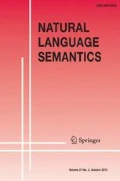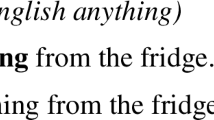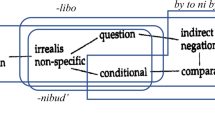Abstract
The goal of this paper is to explain the meaning and distribution of indefinites in comparatives, focusing on English some and any and German irgend-indefinites. We consider three competing theories of comparatives in combination with an alternative semantics of some and any, and a novel account of stressed irgend-indefinites. One of the resulting accounts, based on Heim’s analysis of comparatives, predicts all the relevant differences in quantificational force, and explains why free choice indefinites are licensed in comparatives.
Similar content being viewed by others
References
Aloni, M. 2007a. Free choice and exhaustification: An account of subtrigging effects. In Proceedings of Sinn und Bedeutung 11, ed. E. Puig-Waldmueller, 16–30.
Aloni, M. 2007b. Free choice, modals and imperatives. Natural Language Semantics 15: 65–94.
Aloni, M., and R. van Rooij. 2002. The dynamics of questions and focus. In Proceedings of SALT 12, ed. B. Jackson. Ithaca: Cornell University, CLC Publications.
Balogh, K. 2009. Theme with variations: A context-based analysis of focus. Ph.D. thesis, University of Amsterdam.
Beck S. (2010) Quantifiers in than-clauses. Semantics and Pragmatics 3: 1–72
Beck S., Kim S.-S. (2006) Intervention effects in alternative questions. The Journal of Comparative Germanic Linguistics 9(3): 165–208
Biezma M., Rawlins K. (2012) Responding to alternative and polar questions. Linguistics and Philosophy 35(5): 361–406
Ciardelli, I. 2009. Inquisitive semantics and intermediate logics. Master thesis, University of Amsterdam.
Dayal V. (1998) Any as inherently modal. Linguistics and Philosophy 21: 433–476
Gajewski, J. 2008. More on quantifiers in comparative clauses. In Proceedings of semantics and linguistic theory XVIII, ed. T. Friedman and S. Ito, 340–357.
Giannakidou A. (2001) The meaning of free choice. Linguistics and Philosophy 24: 659–735
Giannakidou, A., and S. Yoon. 2010. No NPI licensing in comparatives. In Chicago Linguistic Society, vol. 37.
Groenendijk, J. and Roelofsen, F. 2009. Inquisitive semantics and pragmatics. Presented at the workshop on language, communication, and rational agency at Stanford, May 2009.
Haida, A. 2010. On the semantics and pragmatics of yes/no-questions, yes/no-question disjunctions, and alternative questions: Evidence from Chadic. Manuscript, Humboldt University of Berlin, draft version of October 8, 2010.
Han C.-h., Romero M. (2004) The syntax of whether/Q... or questions: Ellipsis combined with movement. Natural Language & Linguistic Theory 22(3): 527–564
Haspelmath, M. 1997. Indefinite pronouns. Oxford: Oxford University Press.
Heim, I. 2006. Remarks on comparative clauses as generalized quantifiers. Unpublished manuscript.
Jacobson, P. 1995. On the quantificational force of English free relatives. In Quantification in natural language, ed. E. Bach, E. Jelinek, A. Kratzer, and B. Partee. Dordrecht: Kluwer.
Jäger, A. 2008. History of German negation. Amsterdam: Benjamins.
Jayez J., Tovena L. M. (2005) Free choiceness and individuation. Linguistics and Philosophy 28: 1–71
Kadmon N., Landman F. (1993) Any. Linguistics and Philosophy 16: 353–422
Kratzer, A., and J. Shimoyama. 2002. Indeterminate pronouns: The view from Japanese. In The proceedings of the third Tokyo conference on psycholinguistics, ed. Y. Otsu, 1–25. Tokyo: Hituzi Syobo
Larson R. (1988) Scope and comparatives. Linguistics and Philosophy 11: 1–26
LeGrand, J. 1975. Or and any: The semantics and syntax of two logical operators. Ph.D. thesis, University of Chicago.
Menéndez-Benito, P. 2005. The grammar of choice. Ph.D. thesis, University of Massachusetts Amherst.
Menéndez-Benito P. (2010) On universal free choice items. Natural Language Semantics 18: 33–64
Novel, M., and M. Romero. 2010. Movement, variables and Hamblin alternatives. In Proceedings of Sinn und Bedeutung 14, 322–338.
Partee, B. H., and M. Rooth. 1983. Generalized conjunction and type ambiguity. In Meaning, use and interpretation of language, ed. R. Bäuerle, C. Schwarze, and A. von Stechow. Berlin: De Gruyter.
Port, A. 2010. Epistemic specificity and knowledge. Talk given at the workshop ‘Indefiniteness crosslinguistically’ (DGfS), Berlin, February 2010.
Pruitt, K., and F. Roelofsen. 2011. Disjunctive questions: Prosody, syntax, and semantics. Presented at a seminar at the Georg August Universität Göttingen.
Pruitt K., Roelofsen F. (2013) The interpretation of prosody in disjunctive questions. Linguistic Inquiry 44: 632–650
Roelofsen, F., and S. van Gool. 2010. Disjunctive questions, intonation, and highlighting. In Logic, language, and meaning: Selected papers from the seventeenth Amsterdam colloquium, ed. M. Aloni, H. Bastiaanse, T. de Jager, and K. Schulz, 384–394. New York: Springer.
Romero, M. 2010. Alternative-based semantics combined with movement: The role of presupposition. Talk at the ‘Workshop on alternative-based semantics’, University of Nantes (France), October 29–30, 2010.
Rooth, M. 1985. Association with focus. Ph.D. thesis, University of Massachusetts Amherst.
Rullmann, H. 1995. Maximality in the semantics of wh-constructions. Ph.D. thesis, University of Massachusetts Amherst.
Schwarzschild, R. 2004. Scope splitting in the comparative. In MIT colloquium.
Schwarzschild, R. 2008. The semantics of comparatives and other degree constructions. Language and Linguistics Compass 2: 308–331.
Schwarzschild, R., and K. Wilkinson. 2002. Quantifiers in comparatives: A semantics of degree based on intervals. Natural Language Semantics 10: 1–41.
Seuren, P. 1973. The comparative. In Generative grammar in Europe, ed. F. Kiefer and N. Ruwet. Dordrecht: Reidel.
Shan, C.-C. 2004. Binding alongside Hamblin alternatives calls for variable-free semantics. In Proceedings from semantics and linguistic theory XIV, ed. K. Watanabe and R. B. Young. New York: Cornell University Press.
von Stechow, A. 1991. Focusing and backgrounding operators. In Discourse particles: Descriptive and theoretical investigations on the logical, syntactic and pragmatic properties of discourse particles in German, ed. W. Abraham, 37–84. Amsterdam: John Benjamins.
van Rooij, R. 2008. Comparatives and quantifiers. In Empirical issues in syntax and semantics, vol. 7, ed. O. Bonami and P. C. Hofherr. Paris: CSSP.
von Stechow A. (1984) Comparing semantic theories of comparatives. Journal of Semantics 3: 1–77
Author information
Authors and Affiliations
Corresponding author
Rights and permissions
About this article
Cite this article
Aloni, M., Roelofsen, F. Indefinites in comparatives. Nat Lang Semantics 22, 145–167 (2014). https://doi.org/10.1007/s11050-013-9103-z
Published:
Issue Date:
DOI: https://doi.org/10.1007/s11050-013-9103-z




